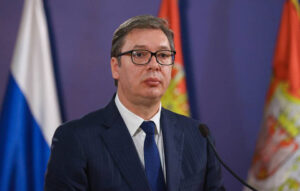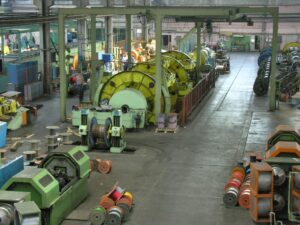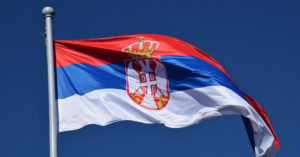
According to Serbian Economist, Serbian President Aleksandar Vucic has announced that the country plans to introduce regular conscription in the near future.
According to him, the term of service may be about 75 days, with the final parameters still being clarified. Vučić also noted that the service should promote responsibility among young people and will not be as harsh as before.
Vučić added that Serbia continues to rearm in order to deter a possible aggressor and intends to remain out of the war.
Croatia has also announced a return to compulsory military service: in October 2025, the country’s parliament approved the reinstatement of conscription, providing for two months of basic training, with the first conscripts scheduled to be recruited in 2026.

According to Serbian Economist, Serbian President Aleksandar Vucic said that early parliamentary elections will be held in the country in 2026.
Speaking to supporters outside the National Assembly building, Vučić said that the authorities had agreed to the protesters’ main demand:
“We have accepted their main demand, and soon, next year, we will go to the polls. Only they will not be so happy when the votes are counted. We are going to defeat them everywhere in Serbia,“ he said.
The Tanjug news agency specifies that the president separately emphasized the need to comply with democratic rules and that ”the country should be ruled by those who receive the majority, not those who think it is better to set fire to buildings.”
No specific date has been set for early parliamentary elections yet. Vučić spoke of voting “next year” and made it clear that he expects a campaign in which the ruling Serbian Progressive Party (SNS) will try to confirm its dominance at the national level.
The last parliamentary elections in Serbia were held early in December 2023; at that time, Vučić’s party and its allies retained their majority in the Skupština amid protests by the opposition, which challenged the fairness of the vote.

According to Serbian Economist, China’s CCSC Technology International Holdings Limited has announced that construction of a cable factory and logistics center in the Serbian municipality of Merosina is scheduled to begin in January 2026.
The company had previously expected work to start in November 2025, but has postponed the deadline. The new schedule was announced during the presentation of financial results for the first half of fiscal year 2026, which ended on September 30, 2025.
As noted in the announcement, the project in Merosina is scheduled for completion at the end of 2026. Once completed, the facility is expected to become the company’s logistics and manufacturing hub for its European operations.
The investment has been discussed with local authorities before: it was reported that the Chinese partners’ enterprise in Merosina could provide about 200 jobs.
CCSC specializes in the production of cables, connectors, and cable harnesses, which are used, in particular, in the automotive industry, robotics, and medical equipment.

According to Serbian Economist, the first Belgrade Film Festival (Beograd Film Festival, BFF) will be held in the Serbian capital from January 30 to February 6, 2026, which the organizers are positioning as a new platform for screening notable world premieres and festival films. The main venue will be the mts Dvorana cinema in the center of Belgrade.
The festival will open with a special screening of Jim Jarmusch’s new film Father Mother Sister Brother, and the program also includes other high-profile works, such as Fatih Akin’s Amrum and François Ozon’s Stranac (The Stranger) by François Ozon, which will be presented to the Belgrade audience as part of the BFF.
The concept of the festival is to combine auteur cinema, festival hits, and new works by masters in one program, making Belgrade one of the stops on the European festival calendar.
According to published information, festival films are being screened at mts Dvorana in the usual cinema format, with tickets sold at the cinema box office and online (including eFinity).
https://t.me/relocationrs/2010

According to Serbian Economist, Ukrainian berry producers and processors conducted a technological business tour to Serbia in December 2025, where they studied practices of growing and industrial freezing of berries, primarily raspberries, according to the Berry Growers Association of Ukraine (BGAU).
The trip was organized by the association with the support of the SIPPO program in Ukraine. Five Ukrainian companies and representatives of the association took part in the tour, visiting Serbian berry growing and freezing enterprises and familiarizing themselves with the cold processing chain – from small refrigerators to facilities capable of freezing up to 30% of the national raspberry harvest.
The UBA noted that despite competition between Ukraine and Serbia on the global raspberry market, the Serbian side demonstrated a willingness to share practical experience and technological solutions. The second day of the visit was devoted to professional training at the Institute of Horticulture in Čačak.
Serbian experience also revealed a number of problems that are also characteristic of Ukraine: the industry’s dependence on manual harvesting, labor shortages, and pressure from weather factors. In Serbia, almost all raspberries are harvested by hand, and the average wage for harvesters in the 2025 season was around €50 per day; small farms with an average area of about 0.1 hectares remain the main suppliers of raw materials for processing.
Context: the role of Serbia and Ukraine in raspberries and exports
Serbia maintains its position as the largest exporter of frozen raspberries and related berry crops in world trade: in 2024, it became the top exporter for commodity item HS 081120 (frozen raspberries, blackberries, etc.) – $313.2 million and 99.0 thousand tons. In 2024, Ukraine ranked 4th among exporters under the same heading – $115.4 million and 61.3 thousand tons.
The main destinations for Ukraine’s exports under HS 081120 in 2024 were Poland and Germany (followed by the Czech Republic, France, and Italy), reflecting the orientation of Ukrainian frozen products towards the EU market and the processing chains of Central Europe.

The Serbian Economist reports that Prindon Sadrija, the husband of Kosovo President Vjosa Osmani, called on Trump’s son-in-law Jared Kushner to move the Trump Hotel project to Pristina, which his organization had previously rejected in Belgrade.
Sadrija wrote on social network X that the withdrawal from the Belgrade project confirms the thesis that “significant projects should unite, not divide,” and suggested “moving this idea to Pristina” with the transformation of the capital’s Grand Hotel into Trump Hotel.
The statement came amid reports that Affinity Global Development, linked to Kushner, has withdrawn from plans to build a hotel and residential complex on the site of the former General Staff building in downtown Belgrade, which was damaged during the 1999 NATO bombing and has been the subject of public controversy over memory preservation and cultural heritage status.
The company notified the decision to withdraw from the project after months of protests and amid a legal scandal surrounding the removal of the site’s protected status, for which the Serbian prosecutor’s office sought to prosecute a number of officials.
In Serbian statements, the losses are estimated at “at least 750 million euros” – a figure that Serbian President Aleksandar Vucic and representatives of the ruling party have voiced, linking the investor’s withdrawal to the pressure of protesters.
At the same time, earlier publications on the parameters of the project estimated the investment at about $500 million.
https://t.me/relocationrs/1999